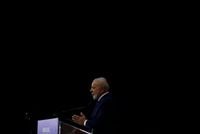On April 16, 2025, President Luiz Inácio Lula da Silva participated in the Army Day celebration at the Army Headquarters in Brasília, marking his third consecutive year attending this significant event. The ceremony not only honored the Brazilian Army but also commemorated the 80th anniversary of the Brazilian Expeditionary Force's victories in Italy during World War II.
The event commenced at 10:00 AM and featured a military parade alongside the presentation of numerous awards. Authorities and military personnel were recognized with prestigious honors such as the 'Order of Military Merit', the 'Brazilian Army Medal', and the 'Tribute to the Brazilian Expeditionary Force Medal'.
In his address, Army Commander Tomás Paiva emphasized the growing global investments in defense, stating, "Looking at the international scenario, we can see that the world is undergoing a rapid and profound transformation in its traditional geopolitical structures. Defense investments are increasing exponentially across all regions of the globe, a reality that suggests our country must pay close attention to the protection of Brazilians and the assets enshrined in the Constitution."
Paiva further articulated the necessity for Brazil to be prepared for diverse and hybrid threats, noting that the national defense must adapt to challenges that do not manifest as clearly as past conventional conflicts. He asserted that active diplomacy and robust Armed Forces must work together to ensure national independence and contribute to the peaceful resolution of international conflicts.
Significantly, the event occurred amid ongoing tensions regarding the trial of military personnel involved in the January 8, 2023 attacks, which were characterized as anti-democratic actions against the Brazilian government. Lula's presence at the Army Day celebration was seen as a gesture of reconciliation with the military, especially in light of his previous remarks in 2023, where he stated he attended to show he holds no grudges against the military.
The political backdrop of the celebration is underscored by recent developments surrounding the military. In March 2025, the former president Jair Bolsonaro and five other military personnel were indicted by the Supreme Federal Court (STF). The court is expected to decide in May whether to accept the charges against a group of ten military members, including two generals and several other high-ranking officers, who are alleged to have participated in plans that included the assassination of Lula and Vice President Geraldo Alckmin.
Amid these controversies, the government announced a 9% increase in the base salary of Armed Forces members, a move that has been positively received within military circles. Additionally, a proposed amendment to the Constitution (PEC) aims to gradually increase national defense investments to a minimum of 2% of Brazil's Gross Domestic Product (GDP), up from the current 1.2%, which is considered low by NATO standards.
However, not all legislative proposals have been received favorably. A bill currently under consideration proposes raising the minimum retirement age for military personnel to 55 years, a change that has sparked debate within the military community. Under the proposed law, military members would have to reach this age by January 1, 2032, to retire, though a transition rule would apply for those currently serving.
Army Day itself, celebrated on April 19, has historical significance, commemorating the 1st Battle of Guararapes in 1648, where local inhabitants of various ethnic backgrounds united to combat foreign invaders. The Army's promotional materials highlight the importance of remembering historical figures such as André Vidal de Negreiros, Filipe Camarão, and Henrique Dias, who are celebrated as heroes of this pivotal battle.
As the ceremony concluded, the atmosphere reflected a complex interplay of military pride, national history, and contemporary political challenges. Lula's attendance served as a reminder of the ongoing dialogue between the government and the military, emphasizing the importance of unity and preparedness in the face of both historical and modern threats.
In summary, the Army Day celebration not only honored the past but also pointed towards the future, with discussions on defense investments and military reforms highlighting the Brazilian government's commitment to strengthening its armed forces amidst a rapidly changing global landscape.








